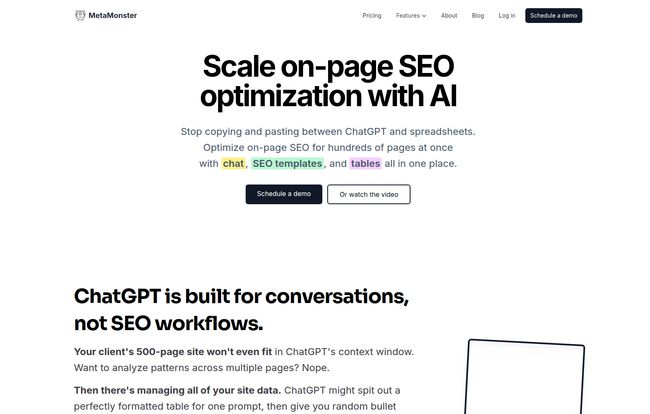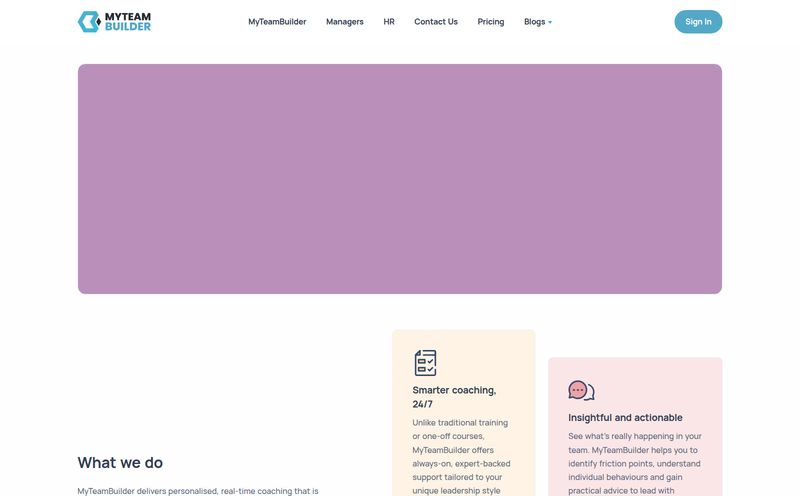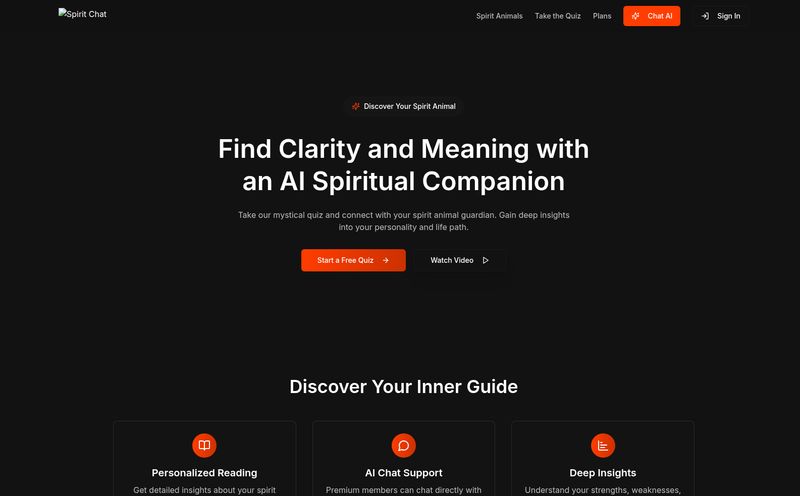There are parts of our job as SEOs that we love. The thrill of seeing a keyword jump to page one, the satisfaction of a successful technical audit, the creative spark of a great content strategy. And then there's the other stuff.
I’m talking about the grunt work. The soul-crushing, mind-numbing task of writing hundreds, sometimes thousands, of unique meta titles and descriptions. You know the drill. You inherit a new client’s 1,500-page e-commerce site, and every single product page has the same title: “Product Page.” It’s a special kind of hell, isn't it?
For years, we’ve done it manually, chugging coffee and listening to podcasts to stay sane. Then came the AI wave. We all tried it. We fed URLs to ChatGPT and asked it to write us a meta description. And… the results were mixed. Sometimes you’d get gold, other times you’d get a generic, soulless paragraph that completely missed the point of the page. It wasn't built for our specific, nerdy needs.
That’s the exact problem MetaMonster claims to solve. It’s not another general-purpose AI. It’s a specialized tool, an AI-powered SEO crawler built from the ground up for people like us. But does it live up to the hype? I decided to take a look.
So, What is MetaMonster, Exactly?
Think of MetaMonster as a specialist, not a general practitioner. Its entire purpose is to crawl your website (or a client's website), identify pages with missing, broken, or just plain awful metadata, and then use AI to generate optimized replacements at scale. It’s designed to be that perfect “Goldilocks” solution—more powerful and focused than just using a ChatGPT prompt, but less overwhelmingly complex than some of the giant enterprise-level SEO platforms.
The core audience here is clear: SEO agencies, freelancers managing multiple clients, and those ambitious niche site creators who are building out massive content portfolios. It’s for anyone who looks at a 500-row spreadsheet of URLs and feels a little piece of their soul die.

Visit MetaMonster
The Features That Actually Move the Needle
A tool can have a million features, but only a few really matter in the day-to-day grind. After poking around, here’s what stood out to me about MetaMonster.
It’s More Than Just a Pretty Wrapper for ChatGPT
This was my biggest fear. I was worried it would just be a fancy interface that sends URLs to OpenAI's API. Thankfully, it's smarter than that. MetaMonster first crawls the page content itself. This is huge. It means the AI isn't just guessing based on a URL slug and H1 tag; it’s actually analyzing the text on the page to understand the context. This leads to far more relevant and nuanced suggestions.
They also bundle in over 30 tested SEO prompt templates. This is a subtle but brilliant feature. Instead of spending an hour trying to craft the perfect prompt (“Act as an expert SEO copywriter and write a compelling, click-worthy meta description under 160 characters that includes the keyword...”), you can just pick a proven template and let it run. Of course, you can write your own if you want to get specific, which is a nice touch for control freaks like me.
A Workflow That Doesn’t Make You Want to Scream
Lord knows we spend enough of our lives staring at spreadsheets, so the familiar grid-like interface immediately feels like home. It crawls your site and presents all your pages in a clean, sortable table. You can see your current title, description, and the AI-generated suggestions side-by-side. No jumping between tabs. No copy-pasting into a separate doc.
From there, you can edit in bulk, approve suggestions one-by-one, or push the changes directly to your site. The direct WordPress plugin integration is a massive timesaver. For non-WordPress sites, the simple CSV export/import is the next best thing and a standard workflow for many of us anyway.
It Was Clearly Built for Agencies
Here’s the part that really caught my eye: every single paid plan includes unlimited sites and unlimited users. Let me say that again. Unlimited sites and users. As an agency guy, this is music to my ears. I'm so tired of pricing models that penalize you for growing your team or onboarding a new client. With MetaMonster, the pricing is based on the number of pages you crawl per month, which is a much fairer and more scalable metric. You can give your whole team access and manage all your clients from a single dashboard without your bill skyrocketing.
My Honest Take: The Good, The Bad, and The AI
Alright, let's get down to it. Is this tool a game-changer? In many ways, yes. I recently audited a new client's blog, which had about 400 articles with atrocious, auto-generated metadata. The old me would have blocked off two full days for that cleanup job. Using a tool like this, you could realistically have high-quality drafts for all 400 pages ready for review in an afternoon. That is an insane return on time.
It’s not just me, either. The testimonial from Sean Sun of Niche Pursuits fame, talking about how it has “honestly impressed” him and his team, carries some weight. When you see experienced people praising a tool's efficiency, you pay attention.
But it's not perfect. And anyone who tells you an AI tool is perfect is trying to sell you something. My biggest piece of advice is this: do not just blindly accept and publish everything the AI generates. Think of MetaMonster as an incredibly smart and fast junior SEO. It does 90% of the work for you, but it still needs a senior SEO (that’s you) to do a final review. You need to check for brand voice, factual accuracy, and that little spark of human creativity. It’s an assistant, not a replacement.
The other thing to be aware of is the page crawl limits. The Starter plan at 2,500 pages/month is great for smaller sites or freelancers, but if you’re an agency regularly auditing massive sites, you’ll need to spring for the Business or Agency plan. Just be mindful of your usage.
A Quick Look at MetaMonster's Pricing
Pricing is always a sticking point, so let's break it down. They offer a simple, three-tiered structure (plus a custom Enterprise plan).
| Plan | Price (Monthly) | Key Features |
|---|---|---|
| Starter | $50 | 2,500 pages/month, Unlimited sites, Unlimited users |
| Business | $100 | 15,000 pages/month, Unlimited sites, Unlimited users |
| Agency | $200 | 100,000 pages/month, Unlimited sites, Unlimited users |
When you consider the value of your own time, this pricing feels very reasonable. How much would it cost to pay a junior SEO or a VA to manually write metadata for 2,500 pages? A lot more than $50, I can guarantee that. The value proposition, especially for agencies on the Business or Agency plan, is incredibly strong.
Who Should Use MetaMonster? (And Who Can Skip It?)
This tool isn't for everyone, and that's okay.
You should definitely check out MetaMonster if you are:
- An SEO agency tired of metadata work eating into your profit margins.
- A freelance SEO juggling multiple clients and needing to show results quickly.
- A niche site owner scaling a portfolio and needing to maintain on-page SEO quality across hundreds of articles.
- An in-house SEO team preparing for a site migration or a major content refresh.
You can probably skip it if:
- You manage a single, small website (under 50 pages). Doing it manually is probably still fine.
- You have zero budget for tools.
- You believe AI is a fad and prefer the artisanal, hand-crafted approach to every single task (I respect the dedication, truly).
Final Thoughts: A Powerful Assistant for Modern SEO
After spending some time with it, my verdict is in: MetaMonster is a seriously impressive tool that delivers on its core promise. It’s a force multiplier. It doesn't replace the need for an experienced SEO strategist, but it does obliterate one of the most tedious and time-consuming parts of our job.
It frees up our time and brainpower to focus on the things that really require human intelligence: high-level strategy, creative content ideas, and building client relationships. It's not magic, but it's the closest thing I’ve found to a metadata magic wand. For any serious SEO professional or agency, it’s absolutely worth a look.
Frequently Asked Questions
Is MetaMonster better than just using ChatGPT for SEO?
In my opinion, yes, for this specific task. ChatGPT is a generalist. MetaMonster is a specialist. Its built-in SEO crawler provides the AI with page context that ChatGPT lacks, and the workflow with templates, bulk editing, and CMS integration is built specifically for optimizing a website, saving you countless hours of copy-pasting and prompt engineering.
Can I trust the AI-generated metadata 100%?
I wouldn't. I'd trust it about 90%. It does an excellent job of generating a high-quality first draft, but you should always perform a final human review to check for brand voice, nuance, and to add any final creative touches. Think of it as a powerful assistant, not an autonomous employee.
Is the pricing really per user or per site?
Nope, and this is one of its best features. The pricing is based on the number of pages you crawl per month. All paid plans come with unlimited users and the ability to manage unlimited websites, making it extremely cost-effective for teams and agencies.
What if I only want to crawl a specific part of my website?
You can do that. The tool gives you the flexibility to run a full site crawl or to select specific pages or sections. This is useful for saving your page credits and focusing only on a new blog section or a specific product category you want to optimize.
Can I try MetaMonster for free?
Yes, their website mentions a way to get started for free, which likely lets you test out the features on a limited basis. They also offer demos for teams that want to see it in action before committing, which is always a good sign.
How difficult is the setup process?
It's designed to be lightweight. For WordPress users, it’s as simple as installing a plugin and connecting your account. For other sites, you can work with a CSV export and import, which is a standard process for most SEOs. It doesn't require a team of developers to get going.



